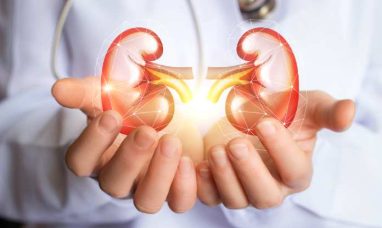- Data presented at the 66th Annual Meeting and Exposition of the American Society of Hematology (ASH)
NORTH CHICAGO, Ill., Dec. 7, 2024 /PRNewswire/ — AbbVie (NYSE: ABBV) today announced updated results from the Phase 1b/2 EPCORE® NHL-2 trial evaluating fixed-duration investigational epcoritamab, a CD3xCD20 bispecific T-cell-engaging antibody administered subcutaneously, plus lenalidomide + rituximab (R2) in adult patients with relapsed or refractory (R/R) follicular lymphoma (FL). Among 111 patients with a median follow-up of over two years, overall response rate (ORR) was 96%, and complete response (CR) rate was 87%. The data (Abstract #342)1 were shared today during an oral presentation at the 66th Annual Meeting and Exposition of the American Society of Hematology (ASH).
“These data highlight the potential benefits of epcoritamab in treating patients with relapsed or refractory follicular lymphoma. Moreover, they show that epcoritamab in combination with the commonly used therapy of lenalidomide with rituximab (R2) could offer a potentially strong and durable treatment option,” said Mariana Cota Stirner, M.D., Ph.D., vice president, therapeutic area head for hematology, AbbVie. “These data are very encouraging as we continue to further evaluate the potential of epcoritamab in combination with R2 in an ongoing pivotal Phase 3 trial and further establish epcoritamab as a core therapy for the treatment of B-cell malignancies.”
FL is typically an indolent (or slow-growing) form of non-Hodgkin’s lymphoma (NHL) that arises from B-lymphocytes and is the second most common form of NHL accounting for 20-30% of all cases.2,3 About 15,000 people develop FL each year in the U.S.4 and it is considered incurable with current standard of care therapies.5 Patients often relapse and, with each relapse the remission and time to next treatment is shorter.6 Over time, transformation to diffuse large B-cell lymphoma (DLBCL), an aggressive form of NHL associated with poor survival outcomes, can occur in more than 25% of FL patients.7
“Because follicular lymphoma is incurable, patients with relapsed or refractory follicular lymphoma need more therapeutic options,” said Lorenzo Falchi, M.D., Lymphoma Specialist, Department of Medicine, Memorial Sloan Kettering Cancer Center. “The durable responses seen in the EPCORE NHL-2 trial support the ongoing investigation of epcoritamab in combination with the standard regimen of rituximab plus lenalidomide.”
Overview of Phase 1b/2 EPCORE® NHL-2 Data Results:
- This study’s primary endpoint was ORR per Lugano criteria, and adult patients with R/R FL received subcutaneous epcoritamab + R2 for up to 12 cycles, followed by 12 additional cycles of epcoritamab monotherapy (28 days each cycle). Among 111 patients with a median follow-up of over two years, the ORR was 96%, and the CR rate was 87%. At 18 months an estimated 89% of complete responders to the combination therapy remained in CR (duration of CR; DoCR), 41 patients completed treatment per protocol. Minimal residual disease (MRD) analysis from blood samples showed that 88% of patients were MRD negative, indicating no detectable disease at 10-6 threshold.8
- COVID-19 was reported in 57% of patients and led to epcoritamab discontinuation in 13% of patients. Five cases of COVID-19 led to fatal treatment-emergent adverse events (TEAEs; COVID-19, n=3; COVID-19 pneumonia, n=2). The other most common TEAEs were neutropenia (62%) and cytokine release syndrome (CRS; 51%). CRS events with the 2-step step-up dose regimen were mostly low grade (38% Grade 1, 12% Grade 2, 2% Grade 3) and primarily occurred following the first full dose. All CRS cases resolved. One case of immune effector cell-associated neurotoxicity syndrome (ICANS) was reported (Grade 1). The CRS and ICANS cases did not lead to treatment discontinuation.
Use of epcoritamab + R2 in R/R FL is not approved in the U.S. or in the EU or in any other territory. The safety and efficacy of epcoritamab for use as a combination therapy in FL have not been established.
Recent Breakthrough Therapy Designation for Epcoritamab:
- The U.S. Food and Drug Administration (FDA) recently granted a breakthrough therapy designation (BTD) for epcoritamab plus R2 for the treatment of adult patients with R/R FL who have received at least one prior line of therapy. Epcoritamab in combination with R2 is being studied further in the ongoing, randomized, Phase 3 EPCORE FL-1 trial (NCT05409066).
About the EPCORE® NHL-2 Trial
EPCORE® NHL-2 is a Phase 1b/2 open-label interventional trial to evaluate the safety, tolerability, pharmacokinetics, pharmacodynamics/biomarkers, immunogenicity, and preliminary efficacy of epcoritamab as a monotherapy and in combination with other standard of care agents in patients with B-cell non-Hodgkin’s lymphoma (B-NHL). The trial consists of two parts: Part 1 (Dose Escalation) and Part 2 (Dose Expansion). The primary objective of Part 1 is safety, and it includes Arm 1-5 and Arm 10. Part 2 includes all 10 arms (Arm 1-10) and the primary goal of all arms, except Arm 7, is preliminary efficacy. Arm 2 of the trial is epcoritamab + rituximab and lenalidomide (R2) in participants with relapsed/refractory (R/R) follicular lymphoma (FL). More information on this trial can be found at https://www.clinicaltrials.gov/ (NCT: 04663347). The primary endpoint was overall response rate (ORR) based on best overall response per Lugano criteria. MRD negativity was assessed as a secondary endpoint.
About the EPCORE® FL-1 Trial
EPCORE® FL-1 is a Phase 3 open-label interventional trial to evaluate the safety and efficacy of epcoritamab + rituximab and lenalidomide (R2) versus R2 alone in patients with relapsed/refractory (R/R) follicular lymphoma (FL). The primary endpoint is progression-free survival (PFS) assessed by independent review committee (IRC) per Lugano criteria. Additional endpoints include percentage of participants achieving complete response (CR), overall survival (OS) and percentage of patients achieving minimal residual disease (MRD) negativity. More information on this trial can be found at https://www.clinicaltrials.gov/ (NCT: 05409066).
About Epcoritamab
Epcoritamab is an IgG1-bispecific antibody created using Genmab’s proprietary DuoBody® technology and administered subcutaneously. Genmab’s DuoBody-CD3 technology is designed to direct cytotoxic T cells selectively to elicit an immune response toward target cell types. Epcoritamab is designed to simultaneously bind to CD3 on T cells and CD20 on B cells and induces T-cell-mediated killing of CD20+ cells.9 Epcoritamab (approved under the brand name EPKINLY® in the U.S. and Japan, and TEPKINLY® in the EU) has received regulatory approval in certain lymphoma indications in several territories. Epcoritamab is being co-developed by Genmab and AbbVie as part of the companies’ oncology collaboration. The companies share commercial responsibilities in the U.S. and Japan, with AbbVie responsible for further global commercialization. Both companies will pursue additional international regulatory approvals for the investigational R/R FL indication and additional approvals for the R/R DLBCL indication.
Genmab and AbbVie continue to evaluate the use of epcoritamab as a monotherapy, and in combination, across lines of therapy in a range of hematologic malignancies. This includes five ongoing Phase 3, open-label, randomized trials including a trial evaluating epcoritamab as a monotherapy in patients with R/R DLBCL compared to investigators choice chemotherapy (NCT04628494), a trial evaluating epcoritamab in combination with R-CHOP in adult patients with newly diagnosed DLBCL (NCT05578976), a trial evaluating epcoritamab in combination with rituximab and lenalidomide (R2) in patients with R/R FL (NCT05409066), a trial evaluating epcoritamab in combination with rituximab and lenalidomide (R2) compared to chemoimmunotherapy in patients with previously untreated FL (NCT06191744), and a trial evaluating epcoritamab in combination with lenalidomide compared to chemotherapy infusion in patients with R/R DLBCL (NCT06508658). The safety and efficacy of epcoritamab has not been established for these investigational uses. Please visit www.clinicaltrials.gov for more information.
EPKINLY® (epcoritamab-bysp) INDICATIONS & U.S. IMPORTANT SAFETY INFORMATION
What is EPKINLY?
EPKINLY is a prescription medicine used to treat adults with certain types of diffuse large B-cell lymphoma (DLBCL), high-grade B-cell lymphoma, or follicular lymphoma (FL) that has come back or that did not respond to previous treatment after receiving 2 or more treatments. EPKINLY is approved based on patient response data. Studies are ongoing to confirm the clinical benefit of EPKINLY. It is not known if EPKINLY is safe and effective in children.
Important Warnings—EPKINLY can cause serious side effects, including:
- Cytokine release syndrome (CRS), which is common during treatment with EPKINLY and can be serious or life-threatening. To help reduce your risk of CRS, you will receive EPKINLY on a step-up dosing schedule (when you receive 2 or 3 smaller step-up doses of EPKINLY before your first full dose during your first cycle of treatment), and you may also receive other medicines before and for 3 days after receiving EPKINLY. If your dose of EPKINLY is delayed for any reason, you may need to repeat the step-up dosing schedule.
- Neurologic problems that can be life-threatening and lead to death. Neurologic problems may happen days or weeks after you receive EPKINLY.
People with DLBCL or high-grade B-cell lymphoma should be hospitalized for 24 hours after receiving their first full dose of EPKINLY on day 15 of cycle 1 due to the risk of CRS and neurologic problems.
Tell your healthcare provider or get medical help right away if you develop a fever of 100.4°F (38°C) or higher; dizziness or lightheadedness; trouble breathing; chills; fast heartbeat; feeling anxious; headache; confusion; shaking (tremors); problems with balance and movement, such as trouble walking; trouble speaking or writing; confusion and disorientation; drowsiness, tiredness or lack of energy; muscle weakness; seizures; or memory loss. These may be symptoms of CRS or neurologic problems. If you have any symptoms that impair consciousness, do not drive or use heavy machinery or do other dangerous activities until your symptoms go away.
EPKINLY can cause other serious side effects, including:
- Infections that may lead to death. Your healthcare provider will check you for signs and symptoms of infection before and during treatment and treat you as needed if you develop an infection. You should receive medicines from your healthcare provider before you start treatment to help prevent infection. Tell your healthcare provider right away if you develop any symptoms of infection during treatment, including fever of 100.4°F (38°C) or higher, cough, chest pain, tiredness, shortness of breath, painful rash, sore throat, pain during urination, or feeling weak or generally unwell.
- Low blood cell counts, which can be serious or severe. Your healthcare provider will check your blood cell counts during treatment. EPKINLY may cause low blood cell counts, including low white blood cells (neutropenia), which can increase your risk for infection; low red blood cells (anemia), which can cause tiredness and shortness of breath; and low platelets (thrombocytopenia), which can cause bruising or bleeding problems.
Your healthcare provider will monitor you for symptoms of CRS, neurologic problems, infections, and low blood cell counts during treatment with EPKINLY. Your healthcare provider may temporarily stop or completely stop treatment with EPKINLY if you develop certain side effects.
Before you receive EPKINLY, tell your healthcare provider about all your medical conditions, including if you have an infection, are pregnant or plan to become pregnant, or are breastfeeding or plan to breastfeed. If you receive EPKINLY while pregnant, it may harm your unborn baby. If you are a female who can become pregnant, your healthcare provider should do a pregnancy test before you start treatment with EPKINLY and you should use effective birth control (contraception) during treatment and for 4 months after your last dose of EPKINLY. Tell your healthcare provider if you become pregnant or think that you may be pregnant during treatment with EPKINLY. Do not breastfeed during treatment with EPKINLY and for 4 months after your last dose of EPKINLY.
In DLBCL or high-grade B-cell lymphoma, the most common side effects of EPKINLY include CRS, tiredness, muscle and bone pain, injection site reactions, fever, stomach-area (abdominal) pain, nausea, and diarrhea. The most common severe abnormal laboratory test results include decreased white blood cells, decreased red blood cells, and decreased platelets.
In follicular lymphoma the most common side effects of EPKINLY include injection site reactions, CRS, COVID-19, tiredness, upper respiratory tract infections, muscle and bone pain, rash, diarrhea, fever, cough, and headache. The most common severe abnormal laboratory test results include decreased white blood cells and decreased red blood cells.
These are not all of the possible side effects of EPKINLY. Call your doctor for medical advice about side effects. You are encouraged to report side effects to the FDA at (800) FDA-1088 or www.fda.gov/medwatch or to Genmab US, Inc. at 1-855-4GENMAB (1-855-443-6622).
Please see Full Prescribing Information and Medication Guide, including Important Warnings.
About AbbVie in Oncology
At AbbVie, we are committed to transforming standards of care for multiple blood cancers while advancing a dynamic pipeline of investigational therapies across a range of cancer types. Our dedicated and experienced team joins forces with innovative partners to accelerate the delivery of potential breakthrough medicines. We are evaluating more than 20 investigational medicines in over 300 clinical trials across some of the world’s most widespread and debilitating cancers. As we work to have a remarkable impact on people’s lives, we are committed to exploring solutions to help patients obtain access to our cancer medicines. For more information, please visit http://www.abbvie.com/oncology.
About AbbVie
AbbVie’s mission is to discover and deliver innovative medicines and solutions that solve serious health issues today and address the medical challenges of tomorrow. We strive to have a remarkable impact on people’s lives across several key therapeutic areas – immunology, oncology, neuroscience, and eye care – and products and services in our Allergan Aesthetics portfolio. For more information about AbbVie, please visit us at www.abbvie.com. Follow @abbvie on LinkedIn, Facebook, Instagram, X (formerly Twitter), and YouTube.
AbbVie Forward-Looking Statements
Some statements in this news release are, or may be considered, forward-looking statements for purposes of the Private Securities Litigation Reform Act of 1995. The words “believe,” “expect,” “anticipate,” “project” and similar expressions and uses of future or conditional verbs, generally identify forward-looking statements. AbbVie cautions that these forward-looking statements are subject to risks and uncertainties that may cause actual results to differ materially from those expressed or implied in the forward-looking statements. Such risks and uncertainties include, but are not limited to, challenges to intellectual property, competition from other products, difficulties inherent in the research and development process, adverse litigation or government action, and changes to laws and regulations applicable to our industry. Additional information about the economic, competitive, governmental, technological and other factors that may affect AbbVie’s operations is set forth in Item 1A, “Risk Factors,” of AbbVie’s 2023 Annual Report on Form 10-K, which has been filed with the Securities and Exchange Commission, as updated by its subsequent Quarterly Reports on Form 10-Q. AbbVie undertakes no obligation, and specifically declines, to release publicly any revisions to forward-looking statements as a result of subsequent events or developments, except as required by law.
Disclosure: Dr. Falchi has financial interests related to AbbVie and Genmab.
1Falchi, et al. Fixed-Duration Epcoritamab + R2 Drives Deep and Durable Responses in Patients with Relapsed or Refractory Follicular Lymphoma: 2-Year Follow-up from Arm 2 of the Epcore NHL-2 Trial. Abstract retrieved from ASH Annual Meeting & Exposition Database. 2024.
2Lymphoma Research Foundation official website. https://lymphoma.org/aboutlymphoma/nhl/fl/. Accessed November 2024.
3Leukemia & Lymphoma Society official website. https://www.lls.org/lymphoma/non-hodgkin-lymphoma/nhl-subtypes. Accessed December 2024.
4Leukemia & Lymphoma Society. https://www.lls.org/research/follicular-lymphoma-fl. Accessed November 2024.
5Ghione P, Palomba ML, Ghesquieres H, et al. Treatment patterns and outcomes in relapsed/refractory follicular lymphoma: results from the international SCHOLAR-5 study. Haematologica. 2023;108(3):822-832. doi: 10.3324/haematol.2022.281421.
6Rivas-Delgado A, Magnano L, Moreno-Velázquez M, et al. Response duration and survival shorten after each relapse in patients with follicular lymphoma treated in the rituximab era. Br J Haematol. 2018;184(5):753-759. doi:10.1111/bjh.15708.
7Al-Tourah AJ, Gill KK, Chhanabhai M, et al. Population-based analysis of incidence and outcome of transformed non-Hodgkin’s lymphoma. J Clin Oncol. 2008 Nov 10;26(32):5165-9. doi: 10.1200/JCO.2008.16.0283. Epub 2008 Oct 6. PMID: 18838711.
8Soong, et al. Abstract 5071: Minimal residual disease (MRD) status by peripheral blood mononuclear cells (PBMCs) and circulating tumor DNA (ctDNA) demonstrates rapid, deep, and sustained response in patients (Pts) with relapsed/refractory follicular lymphoma (R/R FL) treated with subcutaneous (SC) epcoritamab monotherapy in the pivotal phase 1/2 EPCORE™ NHL-1 trial. Cancer Res (2024) 84 (6_Supplement): 5071.
9Engelberts PJ, et al. DuoBody-CD3xCD20 Induces Potent T-Cell-Mediated Killing of Malignant B Cells in Preclinical Models and Provides Opportunities for Subcutaneous Dosing. EBioMedicine. 2020;52:102625. doi: 10.1016/j.ebiom.2019.102625.
![]() View original content to download multimedia:https://www.prnewswire.com/news-releases/investigational-epcoritamab-duobody-cd3xcd20-combination-therapy-shows-high-response-rates-in-clinical-trial-of-patients-with-relapsed-or-refractory-rr-follicular-lymphoma-fl-302325493.html
View original content to download multimedia:https://www.prnewswire.com/news-releases/investigational-epcoritamab-duobody-cd3xcd20-combination-therapy-shows-high-response-rates-in-clinical-trial-of-patients-with-relapsed-or-refractory-rr-follicular-lymphoma-fl-302325493.html
SOURCE AbbVie

Featured Image: Megapixl @ Jirsak
















